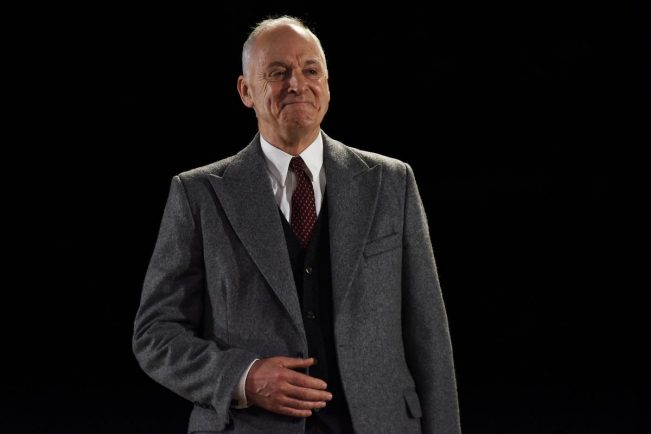THIS REVIVAL of Michael Frayn’s 1998 Tony award-winning drama from Theatre Royal Bath and Jonathan Church Productions is a challenging show both for cast and audience.
It is a cerebral piece surrounding conversations about complex theoretical physics and a factual meeting which took place between two atomic scientist giants, during 1941 in Nazi occupied Copenhagen. It demands concentration, skilful direction and depth of performance.
Director Emma Howlett stepped in for the original director Polly Findlay, who took it right up to technical rehearsal before the second lockdown kicked both the launch and her involvement into touch. Howlett was assistant director so was obviously in the best position to take up the reigns. The combination joins up most of the dots and makes for a unique – if fazing – piece of theatre.
It is set somewhere in some form of afterlife where our protagonists relive the same meeting over and over again without reaching agreement on what the outcome actually was.
The trio of actors offer pretty much flawless performances.
Malcolm Sinclair as Danish Scientist Niels Bohr, looking alarmingly like Channel 4’s Jon Snow at times with his ‘pay attention’ gazes, runs the whole gambit of emotions as he ponders over what was actually said at the meeting.
Philip Arditti plays Bohr’s old protégé and friend, the German-Jew Werner Heisenberg, whose main cry to fame was formulating the ‘Uncertainty Principal’ in quantum mechanics. He is gregarious but with a soft underbelly at times revealing he is aware (though chooses to ignore) that but for the grace of physics he would be in a concentration camp.
Haydn Gwynne is the cement between the bricks as Bohr’s wife Margrethe. Sometimes scathing of the men’s bickering and then saccharine sweet at their friendship – almost in the same breath. For me, Gwynne takes the top prize. Apart from her energy and power, her delivery makes the story a little easier to follow.
Both Bohr and Heisenberg worked towards creating an atomic bomb, Heisenberg for Germany and Bohr as part of the successful team that created said bomb which brought about Japan’s surrender. We of course know that outcome now, but what if this meeting had gone a different way? What if these two giants had fused together to create nuclear fission giving Hitler the ultimate weapon of mass destruction? A sobering thought.
To be honest, I found the evening heavy going – audiences need space in which to reflect, but in this piece there was none. The constant need to try and work out whether we were now in the afterlife or back in 1941 was over challenging and my mind wondered to what was happening in the modern day man semi-final tussle between Italy and Spain rather than what might have been three quarters of a century ago. I am sure it’s a great night out for purists and I salute all those involved – but I found it more of a squib than a banger.
Copenhagen runs at the Malvern Theatres until Saturday, July 10.
Click here for times, tickets and more information.

